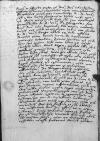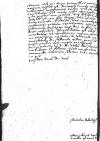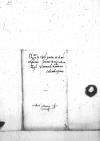Scripturus eram per ⌊Cornelium⌋ Reverendissimae Dominationi Vestrae, sed a die latae sententiae visus mihi non est. Quae cuiusmodi lata sit, iam intellexit procul dubio Reverendissima Dominatio Vestra. De ⌊Alexandro⌋ fuit ⌊reverendissimo domino⌋ cum ⌊reginali maiestate⌋ magna contentio. Cuius res quod prope finem volvi, iam scribit Reverendissima Dominatio Vestra, longe aliud ex ⌊urbe⌋ affertur, dicitur enim denuo ⌊Locae⌋ de canonicatu actionem intentare.
Domini Pruteni est, quod bono sint animo. Vidi enim litteras, quas scripsit ⌊Vilna⌋ ⌊maiestas regia⌋, quibus illa fert gravissime, quod alienis ista castra data sunt.
Nova huc allata sunt, quod ⌊Luterus⌋ sit mortuus, et nescio quae fabulae, quod Fridericus resurrexerit.
⌊Vicini⌋ moneta e regni finibus est exterminata, quod non dubito, quin sit magnam ei molestiam allaturum. De burgrabiatu nihildum scio, quid statuetur. ⌊Constellatus⌋ nolle videtur. Cum Lysmanova quid actum sit, cupide exspectamus. Si quid pro domino ⌊Locca⌋ Reverendissima Dominatio Vestra effecerit, rem valde piam fecerit. Est haec fratrum ingens inhumanitas, quod eos adeo nulla fratris inopiae tangit misericordia.
Palatinatus Marienburgensis iam est domino ⌊Cemae⌋ collatus. Ceterum de exspectativa ad Culmensem pro domino ⌊castellano Culmensi⌋ sollicitandi finem prius non faciam, quam erit consecutus, ac quo facilior eo sit aditus, iam auctoritate ⌊reverendissimi domini⌋ effeci, ut in iudicio Culmensi locum palatini teneret. Fassus hic est ⌊Constellatus⌋ veniendi huc non aliam sibi causam fuisse, quam ne articulos exhibere necesse haberent. Quod quidem obtinuit, sed pro bonis Pucensibus pecuniam accipere iussus est. De accisa tamen quod voluerunt, impetrarunt. Crebro apud me fuit ⌊Constellatus⌋, sed eorum nihil expiscatus est, quae proferri non oportuit.
Quae ⌊Gotschalcus⌋ questus est, ea hic longe sunt aliter commemorata. Producta sunt sententiae h[is] conformes, quarum exsecutionem tutores liberorum Absagen impedire in hunc usq[ue] diem nituntur. Itaque datum est illis mandatum, ut executionem omnino facia[nt] ac priusquam ea facta sit, ulterius ne procedant, descabinata autem prorsus nihil proficerunt neque proficient.
Deum precor, ut Reverendissimam Dominationem Vestram quam diutissime servet incolumem et felicem. Cuius me gratiae commendo.


